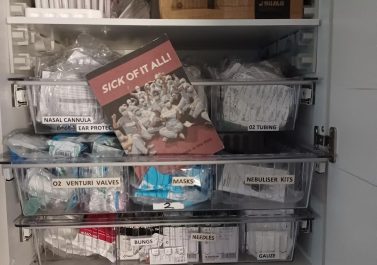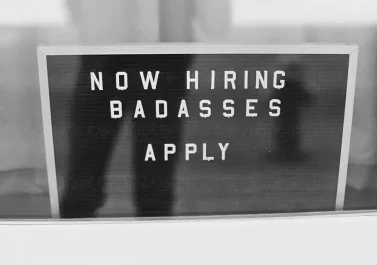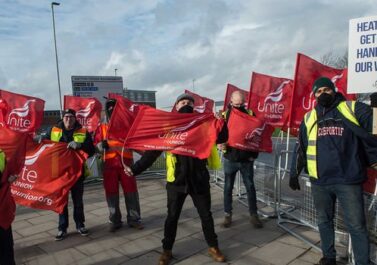Heathrow suffered further strain over Christmas heading into the new year. First with the discovery of the new Covid variant in the lead up to Christmas, which caused countries to ban flights from the UK. Secondly, the government’s removal of safe travel corridors on the 18th January meant much tighter restrictions on all passengers in and out of the airport. With the imminent imposition of new quarantine rules on travellers to the UK, forcing them to stay in hotels at their own expense on arrival, the aviation industry has its back against the wall.
Aviation’s track record on safety has been pretty dismal so far. Even though passenger numbers have fallen drastically (73% lower in 2020), reports of overcrowding in terminals is raising fears that the airport is a super-spreader event waiting to happen. [1] Social distancing in airports is proving difficult. A plane of 300 people would require a check-in queue of about 1km to be adequately socially distanced. The fact that all the passengers are going to be in a sealed cabin anyway adds to the feeling of futility that surrounds efforts to make air travel safe. Like most workplaces, safety concerns at Heathrow are increasing. The measures being adopted to protect passengers and staff probably should have been rolled out a long time ago. But as is the case with everything in our society, profit comes first.
How much money you’ve got also affects how you experience this pandemic. New figures have revealed how wealthy flyers are dodging the travel restrictions the rest of us have had to put up with. In August, private flights returned to 93% of pre-pandemic levels. December saw a similar increase. The flights are still considered “business travel,“ but the destinations have changed. Regular European locations have been shunned, for sunnier destinations like the Maldives and Caribbean islands. [2] Not likely many business conferences are happening there!
As the virus goes on threatening our loved ones and disrupting business as usual, companies continue their attacks on staffing levels and terms and conditions. Budget airline Norwegian, announced the loss of 1,100 jobs at Gatwick. [3] The airline quickly expanded in the good times, offering cheap flights and becoming heavily indebted in an effort to hoover up market share. Norwegian was in financial trouble before the pandemic and is now dumping its staff rapidly. This is a common feature of modern airlines – and lots of other industries (think Carillion). It’s also a good example of how irrationally we organise our workplaces. The system we live in creates airlines that consider nothing but profit, offering super-cheap, environment-destroying flights, creating jobs with continually declining terms and conditions, in an industry that clearly needs to shrink if we’re to avoid our planet boiling. Then a pandemic comes along, which itself is partly caused by our destructive relationship to our planet and thousands of workers get laid off from jobs they probably shouldn’t have been doing in the first place. Isn’t it time we stopped allowing bosses and the shareholders they serve, deciding where and how we should spend the majority of our waking hours?!
From Manchester bus drivers to British Gas engineers to BA Cargo workers, companies are seeking to “fire and rehire” their employees on inferior contracts. Workers are fighting back, but there hasn’t been many attempts to practically link these struggles together, despite the similarity of the situations workers find themselves in. Below, we take a closer look at some of these situations and why the workforce continues to be divided.
Isolation within the same workplace: Heathrow
At British Airways Cargo, the company threatened to cut their workers’ pay (25% for some staff), downgrade other terms and conditions (holiday, sick etc) and break up their bargaining unit (making them negotiate for pay separate to the rest of BA staff). BA also threatened to outsource their cargo operation all together. [4] All this is very similar to what Heathrow Airport Limited (HAL) have been doing with their staff. BA spokespeople, like HAL’s, have been telling the media that large numbers of staff on newer contracts are actually getting a pay rise out of the proposals. Given the 98% return for strike action, it looks as though most staff have seen through these divide and rule tactics. Like a great many workplaces at Heathrow, the divide between staff on old and new contracts is a tricky one to navigate. A cargo worker told us that although most of the newer staff walked out during the strike over 9 days on Boxing Day,, there is still a feeling that they are under-represented and that the strike was mainly about protecting the old contracts. Although the old guard on the night shift stand to lose £11,000 and 20 year bods stand to lose £8,000, these are still amounts that newer starters never had in the first place.
As is the case elsewhere at Heathrow, workers that have been there a long time also often occupy the easier jobs and the better shift patterns. Resentment can easily grow and just as easily derail industrial action if left unchecked. In this particular instance, it’s believed the timing of the strike at Christmas and the £70 a day strike fund, may have been enough to get newer starters on board with the strike. But any strategy that is going to last will need to address the inferior conditions of newer starters. Workers on these contracts need a forum where they can make their own demands.
This holds true for the HAL dispute as well. A new strike date has been announced for the 5th February. The purpose is to show HAL that the dispute isn’t going away and that when things pick up, they will be in for a fight. Just before the new HAL date was announced though, the latest round of BA Cargo strikes were postponed the day before they were scheduled to take place (22/01/2020) to allow time for fresh negotiations. The BA strike was then cancelled the following week. The union proclaimed a tub-thumping victory as always, but the small print stated that: “Workers will revert to previous contractual provisions subject to agreed changes”. There is no detail of what these changes are. When we spoke to a cargo worker, he claimed not to know either. It’s good that old contracts are defended, but what does it mean for people on new contracts, and what does ‘agreed changes’ mean? More importantly, why is Unite not using the stronger economic clout of Cargo to help defend conditions of HAL ground staff?
What is clear, is that the whole situation is screaming out to be linked up in some way. Two sets of workers in the same union, in the same industry, in effectively the same workplace, in dispute at the same time, over almost exactly the same issues and they are not linking up their strikes?! It’s a sign of the times and unfortunately not surprising. The union’s response to BA’s fire and rehire threats at the start of the pandemic highlighted that workers’ focus is no longer ‘too sectoral’ but ‘too departmental.’ [5] Even unified responses within companies are hard to come by these days, let alone across industries. There are loads of reasons for this problem, but the first step is to admit it is a problem. Much more criticism needs to be levelled against those that do not acknowledge or try to minimise this problem.
Unions understandably want to emphasise the benefits of workers being in a union. However, this sometimes takes the form of triumphant declarations of victory at times when any kind of concession has been won from employers. Often what is needed at these times is an honest assessment of what “winning” should look like. We can still be happy that BA didn’t get away with murder, while acknowledging the flaws in our strategies. In fact, we believe it’s a good way of showing solidarity to your fellow workers. Workers are continually giving up too much ground. It is obviously, almost always beneficial for workers to be in a union. But, when relative to other workers, unionised workers’ living standards are simply declining slower than the living standards of non-unionised workers, is this really something to celebrate? How do we get on the front foot? How do we turn the tide and start winning big, without linking up our disputes?
Isolation within the same company: Rolls Royce
The huge (online) school teachers’ mobilisations across the country and across the unions forced the government into a u-turn when it came to reopening of schools after Christmas. The government choosing to scrap their “review of employment rights,” after a unified statement from a number of unions, shows the political class is feeling far from confident. Unions don’t seem to be capitalising fully on these shows of weakness though. The Rolls Royce dispute at Barnoldswick, didn’t even manage to spread across the company, let alone across the industry. We attended a Facebook live event where the host ignored at least two questions in the comments clearly stating that the rest of the Rolls Royce Combine should be getting involved in the dispute. Instead the host read out numerous questions for the panellists to answer about what the “government should be doing to help the workers.” After going on a staggered strike for nine weeks, they got a deal that guarantees them at least 350 staff, manufacturing for ten years and no more redundancies for two years. It’s highly likely that without this fight the site would have been offshored as planned. However, the site is still getting smaller. 520 staff were employed at the site at the start of the dispute and a great deal more in the not so distant past. What could have been achieved if more workers had been directly involved in the dispute? .
This dispute, like so many others right now, was begging to be escalated across companies and industries, but wasn’t. In the years to come, how resilient will this workplace be against the numerous pressures that the global economy is throwing up? It is a victory, but how firm are the foundations it was built on?
Struggles on the horizon
- Passport Control workers in the PCS union have voted to strike over changes to their roster. Previous arrangements have allowed staff flexibility, which was especially helpful for workers with caring responsibilities at home. Their employer, the Home Office, is saying the changes are to keep the workplace COVID safe. Workers believe this is simply opportunism on the part of their employer to bring about changes they would prefer. [6] Sounds very familiar. With HAL workers set to strike on the 5th February, this is another good opportunity for unions to work together and coordinate their actions.
- British Airways are continuing their cuts, but are now also focusing on their contractors. Xerox post room staff were unnecessarily rushed through a redundancy process in the run up to Christmas and given notice of redundancy on New Year’s Eve. And CBRE Property maintenance staff on the BA contract are in the process of having their numbers cut to unsafe levels. Buildings are in a poor condition due to lack of maintenance and air conditioning systems are not being maintained to the standard required during a pandemic. The GMB is considering escalating the situation to the Health and Safety Executive. [7]
What next?
It’s fairly clear that unless workers start combining their efforts across unions, companies, industries and eventually borders, we’re not going to be able to resist the bosses’ blitz on our conditions. Workers on the HAL picket lines in December were keen to combine their efforts with the BA Cargo workers. [8] Workers can see the logic and there is a definite appetite for it. Loads of workers at Heathrow and in aviation everywhere are in the same boat. If we were better organised, we would be able to offer support outside of our industry as well. The British Gas engineers are currently fighting their own “fire and rehire” battle at the same time as many of us. Their fight is made harder by the fact that within their own company they are isolated. British Gas office staff in Unison, voted to accept the contract changes, while engineers in the GMB voted to strike. British Gas was making huge profits before the pandemic and hasn’t been particularly adversely affected by the crisis. The company’s opportunistic move is even more blatant than the aviation industries efforts.
Even before the crisis, while companies have been making massive profits, most of us have been seeing our living standards squeezed. The pandemic is just accelerating the downward trend. In early January, BA confirmed a £2billion loan underwritten by the government and boasted that “that it continues to have strong liquidity with cash and undrawn facilities of €8.0 billion as of November 30th” 2020. [9] The boards, shareholders and the management lackeys at these companies are going to be okay. Why should our fellow workers struggle to make ends meet? We don’t have to accept it. Full support and solidarity with HAL and Home Office workers in their upcoming struggles!
Together we can apply the pressure needed to make sure we aren’t the ones that pay for the bosses crisis. If you want to get involved with our efforts to bring this about, or have any information about what’s happening on the ground at your workplace, get in touch!
Email:-
heathrowworkers@protonmail.com
Twitter:-
@heathrowworkers
Facebook:-
Heathrow Workers Power
Call or text:-
07340 082667
[1]https://ukaviation.news/heathrow-under-fire-after-super-spreader-crowds-in-terminal-2/?amp=1
[4]https://heathrowworkerspower.wordpress.com/2021/01/04/ba-cargo-strike/
[5]https://angryworkersworld.wordpress.com/2020/06/22/crisis-in-the-air-where-are-the-workers-voices/
[6]https://www.union-news.co.uk/passport-control-staff-vote-for-strike-action/
[8]https://heathrowworkerspower.wordpress.com/2020/12/13/heathrow-workers-newsletter-no-2/



